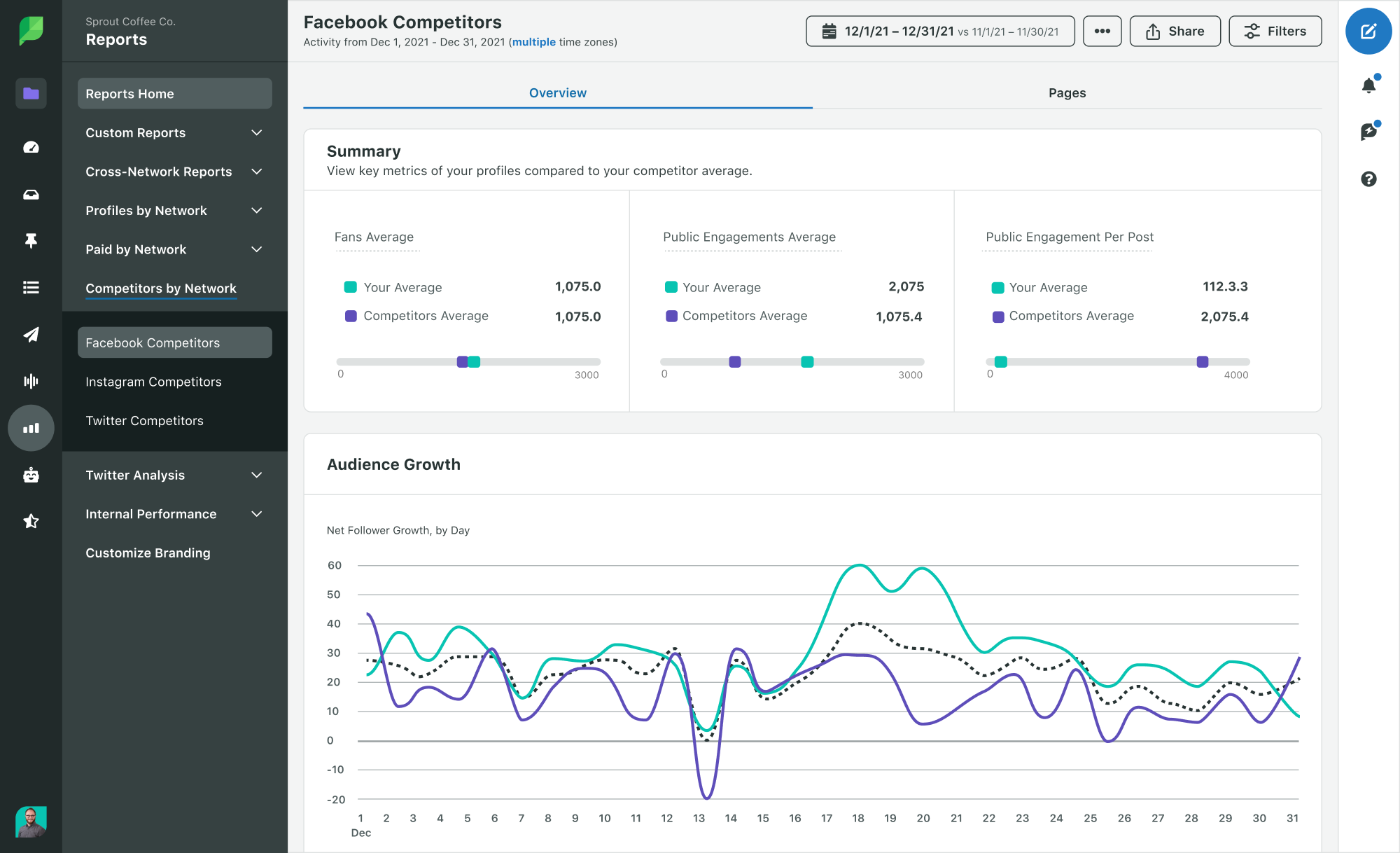
Reputation Management
Business reputation management guide: Strategy, tools and the Sprout Social advantage
Discover how to shape and safeguard your brand’s image to foster trust, boost visibility, and attract top talent in this article. And, uncover strategies to proactively position yourself with a competitive advantage.
Reading time 13 minutes
Published on December 18, 2025

Table of Contents
Summary
- Reputation management involves influencing perceptions of your business. This includes monitoring online reviews, responding to feedback and actively managing your brand's image through various business functions like marketing and customer experience.
- Maintaining a positive brand reputation is crucial for building trust, boosting visibility and attracting top talent. Effective reputation management strategies focus on online review management, social listening, customer experience, crisis communication and brand advocacy.
- Implementing a proactive and reactive reputation management strategy involves using specialized tools to monitor and respond to feedback across various channels, analyzing data to track performance and promoting positive aspects of your brand while addressing negative feedback promptly and effectively.
News travels fast these days, and it doesn’t take much for a brand’s reputation to take a hit. Any internal or external interaction makes (or breaks) your organization’s reputation, and a few unmanaged negative online reviews or posts will turn away customers or candidates for good.
But you don’t need to leave your reputation up to other people’s opinions and judgments. You curate and maintain a positive brand reputation through business reputation management. To reap the short- and long-term rewards of reputation management, you need to be consistent and strategic.
This article will dive deep into what reputation management encompasses and why it’s important. Plus, we’ll walk you through creating a social media reputation management strategy for your brand and tools to support your workflow automation.
What is reputation management?
Reputation management is the practice of influencing what people think of your business or brand. A brand’s reputation has three core elements: how others see it, how the company operates and performs and what the brand communicates about itself.
Cultivating a strong brand reputation involves monitoring what people think and say about the organization, responding to misleading information, malicious allegations and negative reviews, and generally looking out for and acting on opportunities to increase the organization’s reputation.
One person or department rarely owns business reputation management. It involves many business functions like marketing, communications, customer experience and sales.
Take a brand like Patagonia, for example. Recently ranked as the company with the best reputation in the US, people see Patagonia this way because of its commitment to fighting climate change. They’re also good at getting attention for their initiatives, which boosts their reputation, such as founder Yvon Chouinard’s recent decision to give away the company’s shares to “Mother Earth.”
Why is business reputation management important?
Business reputation management is essential because it directly impacts customer trust, purchase decisions and revenue growth. A strong reputation builds credibility, attracts talent and provides competitive advantages that drive measurable business results.
Here are the key reasons reputation management delivers business value:
Maintaining a professional image
From ill-timed posts to product fails, every brand makes mistakes, and how you handle them is a critical part of brand safety. How your employees conduct themselves online and in person also impacts your brand’s reputation. A slight misstep can become a severe crisis if you don’t address it in the right way or at the right time.
For example, if your employees are sharing derogatory content online or responding to reviews in an inflammatory manner, this will reflect poorly on your company.
Creating a company social media policy and guidelines for social media customer service help protect your brand’s reputation while avoiding potential PR disasters.
Boosting brand visibility
Have you heard the saying, ‘All press is good press’? While this idea might not be entirely accurate, it is still advantageous to have many people positively talking about you online.
For example, after a viral TikTok video from a customer, skincare brand Bubble saw its Walmart store sales double and sold 70% of its entire stock portfolio at Ulta Beauty stores. Plus, reviews also help your business rank higher in search engine results.
Building trust and credibility
Did you know that 76% of consumers “regularly” read online reviews when browsing for local businesses? And 46% of consumers feel that online business reviews are as trustworthy as personal recommendations from friends or family.
These stats from BrightLocal’s study illustrate the power of reputation management. Customers view brands with more positive reviews and recommendations as trustworthy and credible.

Understanding customer preferences
Do you know what people like and dislike about your brand, product or service? Tuning into the conversation around your brand will uncover valuable insights. For example, you know what pain points to focus on if you keep getting the same complaints. You can also use customer feedback to double down on what’s working or develop new offerings.
Dispelling rumors and misleading information
Anybody can post anything they want online, so misinformation spreads fast. Brands must be even more diligent in responding to misleading claims. Fortunately, Sprout Social’s Advanced Listening and AI features automate tracking negative comments via keywords and hashtags in real time, so you can respond promptly and defuse issues before they implode.
Increasing revenue
According to McKinsey research, products with three- or four-star ratings generated three times more sales than those with one-star ratings.
Customers value service over price, which means strong reputations enable competitive pricing strategies.
Key revenue impact:
-
Higher conversion rates: Better ratings directly correlate with increased sales
-
Premium pricing power: Trusted brands command higher prices
-
Customer retention: Positive experiences drive repeat business
Establishing thought leadership
Your brand’s reputation isn’t solely defined by what others say about you. It’s also determined by what your organization shares about itself.
For example, with their Real Beauty campaigns, Dove has solidified itself as a body-positive brand. After research uncovered women’s negative perceptions of beauty, they sought to change the conversation about beauty and build their brand with body-positive and inclusive marketing.
Decades later, Dove is a recognized thought leader in body confidence through initiatives like their Self-Esteem Project.
Attracting top talent
The best candidates want to work for the best employers. Simple as that. Compensation is important and always will be. But a strong brand reputation will give you an edge over your competition and attract top talent to your company.
According to Glassdoor, 50% of work candidates say they wouldn’t work at a company with a bad reputation—even if they got a pay raise.
3 Phases of reputation management
Reputation management isn’t a one-time fix. It’s a continuous cycle. To master it, you need to manage your reputation through three key phases: building, maintaining and recovering.
Let’s break down what each phase demands.
Phase 1 – Build: Lay your foundation
This is your proactive phase. It’s where you define your brand’s values and voice. You’ll create and share content that tells your story authentically. The goal is to build a reserve of positive sentiment and establish a strong, trustworthy brand identity before a crisis ever hits.
Phase 2 – Maintain: Monitor and engage
Once your foundation is solid, you shift to maintenance. This phase is all about listening, and you’ll use Sprout’s Social Listening to monitor conversations about your brand, industry and competitors. It’s your chance to engage with your community, manage online reviews and reinforce your brand’s positive standing day in and day out.
Phase 3 – Recover: Respond to challenges
No brand is immune to negative feedback or a crisis. This is the reactive phase. When challenges arise, a solid recovery plan is your best defense. This means responding to negative comments quickly and transparently, correcting misinformation and turning negative experiences into opportunities to demonstrate your commitment to your customers.
6 essential aspects of reputation management
Reputation management isn’t just about taking charge of the story around your brand. It’s about tuning in to what your people, customers and audience are saying. You need to take their feedback to heart and respond in a way that builds trust while showcasing your values.
Here are six critical aspects of reputation management that work together to protect and enhance your brand:
-
Online review management: Monitor and respond across all platforms
-
Social listening: Track brand mentions and sentiment
-
Customer experience: Deliver consistent, positive interactions
-
Crisis communication: Prepare for and manage negative events
-
Competitive analysis: Benchmark against industry standards
-
Brand advocacy: Amplify positive customer voices
Online review management
From Google to Yelp to Glassdoor, there are plenty of ways for people to review and rate their experience. Online review management involves:
-
Monitoring review networks, such as Google My Business, Facebook, TripAdvisor, Yelp, Glassdoor
-
Responding to reviews
-
Identifying trends and pulling out insights that help you improve your service
Social listening and qualitative research
Social listening will help you better understand what people think of your brand. Gain insight into what people say about you and your industry on social media.
You can also conduct qualitative research like surveys, interviews and focus groups. Directly ask your customers and employees how they feel about your company, and use this intel to deliver even better experiences. Sentiment and trend analysis from social listening can inform what questions to ask in that qualitative research.
Customer experience
Providing a great customer experience is crucial to building your brand’s reputation—and neglecting it can come with serious consequences.
According to The Sprout Social Index™, 73% of social users will choose a competitor if a brand fails to respond on social media.
Crisis communication
You don’t have to be a huge brand to get caught up in a viral scandal that could damage your company’s reputation. A social media crisis management plan will prepare you for the unexpected with tools and tactics to act fast and recover quickly.
Competitive analysis
Do you know how your brand’s perception stacks up against your competitors? Conduct a competitive analysis to set benchmarks for your brand reputation strategy. See what you need to do to get (or stay) ahead and gain insight into how people feel about your industry.
For example, with Sprout Social’s competitive reports and listening tools, you will see side-by-side competitor comparisons of key reputational performance metrics like share of voice, engagement, sentiment and impressions.

Brand advocacy
Let your customers and employees sing your praises for you. To harness the power of brand advocacy, you need to identify, engage and reward your advocates. Build a relationship with them and encourage them to keep spreading the word about you.
For example, collect and reward UGC that reviews your product or service, or create an employee advocacy program that provides content for your people to share, making it easier for them to spread the word while maintaining some control over messaging.
How to create a reputation management strategy
An effective reputation management strategy must be reactive and proactive. You must respond quickly to feedback and mentions to cultivate your online reputation over time and avoid public missteps. Here is a breakdown of creating an effective strategy using a reputation management tool.
1. Choose your online reputation management tool
From review networks to social media to press mentions, there are a lot of channels for people to share their opinions about your brand. But monitoring and responding to everything people say manually is time-consuming.
A reputation management tool, like Sprout Social, automates the process with timely insights and easy-to-use communication features so you execute initiatives fast, respond to feedback and focus more on your overall strategy.
2. Gather your data from external sources
There are three sources of information that you should use for monitoring your reputation at all times:
-
Listening data (i.e., what people are saying about you online and on social media)
-
Competitor data (i.e., insights on how your competitors are performing online and their brand perception)
-
Reviews data (e.g., Google, Yelp and Glassdoor reviews)
Sprout Social collects data from all these sources so you can track, analyze and optimize in one convenient workspace.

3. Gather customer data
Inbound social messages, customer and employee feedback and help center data are also valuable sources of information that influence your reputation.
Sprout integrates with your help desk and CRM platforms like Zendesk and HubSpot to see all this data in one dashboard for a holistic view of the end-to-end customer experience.

4. Review your brand experience
Once you’ve collected your internal and external data, you must analyze it. Here are some crucial KPIs to track to see where you’re at and set future goals.
-
Feedback volume: How many reviews/mentions/comments are you getting? Have you seen any spikes or dips?
-
Sentiment analysis: What’s the general tone of reactions your brand is getting? Does it skew more positive or negative?
-
Share of voice: How many conversations do you control in your market?
-
Feedback trends/themes: What content do people share about your brand? What are some common customer/employee questions, comments and complaints?
Pulling all this data manually is a chore, but Sprout Social’s Analytics and Listening Reports make this step a breeze with presentation-ready insights, including sentiment analysis and share of voice visualization.
5. Be ready to respond to online reviews and social comments
Expectations for social customer service are at an all-time high. According to The Sprout Social Index™, nearly 75% of consumers expect brands to respond within 24 hours or less.
To keep up the pace, you need an online reviews tool for managing processes and protocols that empower your team to deliver timely and brand-aligned responses to feedback. For example, you can use Sprout Social’s Message Tagging and Automated Message Routing to track customer issues and delegate responses, and leverage Saved Replies for frequently asked questions.
6. Close the loop
Responding to all customer and employee feedback should be a given. But it’s not a simple checkbox activity. Your customers don’t just want to feel acknowledged. You need to affirm that you’re using their feedback to understand, refine and improve their experience with your brand.
Here’s how closing the loop works in practice:
Let’s say you run a retail company. A customer leaves a Google review about receiving the wrong color t-shirt.
With Sprout Social’s integrated workflow, your social team can:
-
Immediately respond: Social team acknowledges the issue publicly
-
Internally coordinate: Customer service gets tagged to send correct product and coupon
-
Improve processes: Operations team analyzes the issue to prevent recurrence
7. Be proactive
Social media’s ‘always-on’ nature means reputational threats occur at any time. Constantly monitoring inboxes and dashboards drains your social and marketing teams.
Proactive monitoring solves this challenge:
With Sprout Social’s Spike Alerts, your teams get notified whenever there is an influx of incoming messages or brand or keyword mentions, so they have a near real-time track of negative comments or feedback.

That way, they can quickly acknowledge and handle the situation before it gets out of control. You can also use Saved Replies and Automated Chatbots to deliver quick, on-brand responses—even when your team’s offline.
Being proactive means being on it with real-time online notifications. It also means considering your broader brand reputation strategy. If you haven’t already, check out our brand safety checklist to ensure that your strategy is covering all the bases to protect your reputation online.
8. Actively promote the positive aspects of your brand
If people publicly profess their love for your brand, find ways to amplify it and use it in your social media, website and other marketing efforts. Plus, while social proof and user-generated content are great for building trust, you don’t have to wait for others to talk about you. Also use content marketing, social media and PR to highlight the positive aspects of your brand.
9. Ask for positive reviews
Want to get more positive reviews from your customers? Start by asking them directly, but the more you can systemize and automate the process, the better. For example, use automation features like Saved Replies and Bot Builder to send happy customers a link to your Google My Business page.
10. Forecast potential trends
Follow the news and be aware of current events and industry breakthroughs. Stay on top of what’s happening with social listening to identify positive brand associations through PR and storytelling.
For example, after the French Open banned the catsuit tennis star Serena Williams wore in May 2018, Nike launched their “Voice of Belief” campaign, in which she starred and posted “You can take the superhero out of her costume, but you can never take away her superpowers.”
Top business reputation management software in the market
The right reputation management tool automates critical tasks and saves time.
Here’s a comprehensive comparison of leading platforms:
|
Platform |
Best For |
Key Features |
Social Media Management |
Review Management |
Social Listening |
|---|---|---|---|---|---|
|
Sprout Social |
Brands with established social presence |
AI-powered workflows, sentiment analysis, unified inbox |
✓ Full suite |
✓ Multi-platform |
✓ Advanced analytics |
|
Qualtrics |
Market research & surveys |
100+ question types, predictive intelligence |
✗ Limited |
✗ No |
✗ Focuses on Survey/CX Data |
|
Yext |
Multi-location businesses |
Listings management, directory updates |
✗ No |
✓ Basic |
✗ No |
|
Podium |
Local businesses |
Text messaging, web chat, payments |
✗ No |
✓ Basic |
✗ No |
|
Birdeye |
Local/Multi-Location Business Focus |
Automated review requests, AI analysis |
✗ Limited |
✓ Yes |
✓ Yes |
Sprout Social
Sprout Social is a one-stop shop for reputation management. Our Smart Inbox unifies all incoming messages, comments, and online reviews (from platforms like Google My Business and Facebook), making it the control center for closing the loop with customers. The platform’s features, powered by AI and automation—including Automated Message Routing and AI-enhanced agent replies—enable your teams to quickly tag, delegate and respond to all feedback, from a direct message to a Google review. Coupled with our sentiment analysis and social listening features, Sprout allows you to work smarter, accelerate your strategies and focus on creating human connections.

Qualtrics
Qualtrics is a feedback collection platform that helps brands collect and organize customer, employee and market data. It has over 100 question types and ready-to-use templates and can distribute surveys via mobile devices, in-app, web, chatbots and other methods. It also has built-in predictive intelligence and statistical analysis features so users can uncover trends and themes.
Qualtrics is a qualitative research tool that focuses on surveying specific audiences, and it’s best paired with other tools for social listening, review management and competitive analysis.
Yext
Yext helps businesses manage their online footprints. It’s most well-known for its listings management features, allowing users to automatically update their information across major online directories and search engines. It also offers some review management and competitive analysis features such as a centralized review dashboard, personalized responses, review requests and competitor average rating tracking.
But Yext focuses on listings management, so you’ll need a different tool to monitor, respond and share brand stories through social media. Yext is best suited for brick and mortar businesses that regularly change locations or are rapidly expanding in multiple areas.
Podium
Podium helps local businesses handle all their communication in one place. It offers web chat, text campaigns, messaging and calling features. It also provides a range of payment options that customers can access via text for more convenience.
It’s a solid tool for customer service and communication, and handling reviews and requests coming through those channels since it doesn’t have social media management functionality or access to social analytics.
Birdeye
Birdeye helps businesses send automatic review requests, respond to customer reviews, distribute surveys, fix listings across the Internet and connect with customers via web chat and text message. It also has AI-powered analysis functionality to extract actionable and measurable insights and sentiment trends from text data.
It’s best suited for businesses that are starting to build their social media presence since it doesn’t have in-depth social media analytics and reporting.
Protect your brand’s reputation
Reputation management is a long game. It’s all about building trust with your audience over time. Everyone makes mistakes, and even the best brands get some not-so-great reviews sometimes. But a strong reputation management strategy will help you weather any storms that come your way and position your brand in the best possible light.
Ready to take control of your brand’s image? Experience our full range of reputation management features with a free 30-day trial.
FAQs about Reputation Management
What's the difference between reputation management and crisis management?
Reputation management is the ongoing process of shaping public perception, while crisis management is the reactive plan you activate during major negative events.
How long does it take to see reputation management results?
You’ll see immediate benefits from faster customer responses, but building deep trust and changing brand sentiment takes consistent effort over months to years.
Can small businesses benefit from reputation management?
Yes, small businesses especially benefit since negative reviews have outsized impact and proactive management builds loyalty while differentiating from local competitors.
How often should I monitor my brand's reputation?
Monitor your brand reputation daily using automated alerts, since social media conversations happen in real time and require immediate responses.
Do I need to respond to every review and comment?
While responding to every review shows you value customer feedback, prioritize negative reviews and detailed feedback first. For positive reviews, a simple thank you goes a long way. Use templates and automation to scale your responses efficiently.
What metrics should I track for reputation management?
Track sentiment analysis, review volume and ratings, response time, share of voice, brand mentions and customer satisfaction scores. These metrics help you measure reputation health and identify areas for improvement.
Additional resources for Reputation Management
Online review management: Unlocking brand growth in 2026
The 10 best reputation management services for your brand in 2026
Business reputation management guide: Strategy, tools and the Sprout Social advantage
Corporate reputation management: How to use social listening to protect and build brand trust
Brand health tracking: Metrics, tools and best practices for 2026
Social media reputation management: How to stay in good standing with your audience
The top 15 online reputation management tools and how to choose the best one for your business
Google review management: The complete guide for your brand
Social proof: How to use psychology in digital marketing
Brand safety: What you need to know to protect your brand’s reputation
Brand storytelling: Creating a story that resonates
Everything you need to know about online reputation management
How to create a complaint management system to protect your brand reputation
Online reputation monitoring: What it is and why it’s important for business
What is a brand community and how to build a successful one
Why it’s time to break up with your biannual brand survey
How to ask for reviews effectively [+ examples]
How to build a brand: Sprout Social reveal their secrets
Co-branding: What it is and why your brand should use it
The complete guide to personal branding
Brand messaging: How to create a framework
Brand authenticity: What it is and tips for building it
Brand strategy: What it is and how to create a strong framework
How to master the 3 pillars of brand reputation management
What is earned media? 5 Tips for a successful earned media strategy
Guide to using inclusive language for your brand and business
What is a brand mission and how to define it
Why “reality apathy” is the next battle in brand reputation




























Share